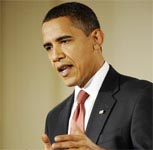Republicans: Obama plans to "Europeanize" the United States
 Washington - Republican legislators slammed President Barack Obama's economic agenda on Friday for mimicking the ideals of socialist European governments, one day after the president revealed his 3.6-trillion-dollar budget for 2010.
Washington - Republican legislators slammed President Barack Obama's economic agenda on Friday for mimicking the ideals of socialist European governments, one day after the president revealed his 3.6-trillion-dollar budget for 2010.
At a conservative policy gathering in Washington, lawmakers repeatedly attacked Obama for planning a massive uptick in spending on energy, education, health care and other programmes.
"Pushing back these efforts to basically Europeanize America will not be easy," Mitch McConnell, the top Republican in the Senate, told the Conservative Political Action Conference.
Obama on Thursday released the outline of his 2010 budget and priorities over the next 10 years. It includes a more than 600- billion-dollar downpayment on health care reform and 15 billion dollars per year for renewable energy investments.
Obama's budget would increase the federal deficit in 2009 to 1.75 trillion dollars in 2009 - 12.6 per cent of gross domestic product - and 1.2 trillion dollars in 2010.
The administration believes it can trim the deficit back to 533 billion dollars by 2013, once the US economy pulls itself out of a deep recession. The 2010 budget faces a bruising battle over the coming months in Congress.
"Americans have gotten a glimpse of the big government plans of Obama and the Democrats and millions are ready to stand up, speak out, and yes, even take to the streets to stop America's slide into socialism," South Carolina Senator Jim DeMint told the gathering of conservative activists from around the country.
Socialism has long held negative connotations in the United States as a representation of leftist ideals that go against the US free- market tradition.
That US tradition, by contrast, has come under heavy fire in Europe in recent months amid a massive financial crisis, which has spread around the globe and is largely blamed on the kind of free- wheeling, underregulated capitalism practiced on Wall Street.
The financial crisis has sparked concerns about another idea that strikes fear in the hearts of many politicians and voters in the United States: nationalization.
Wall Street stocks tanked last week when one Democratic senator, Christopher Dodd, suggested nationalizing banks may be the only option to stave off a devastating wave of bankruptcies. Ever since, the Obama administration has repeatedly insisted it has no such plans.
The Republican criticisms this week harked back to a common theme through much of the 2008 presidential campaign.
Republican contender John McCain jumped on Obama's comments in October that he planned to "spread the wealth" by raising taxes on the wealthiest workers, which was itself a feature of Obama's budget outline Thursday.
"At least in Europe, the socialist leaders who so admire my opponent are upfront about their objectives," McCain said in one radio address in October.
Republicans also focused their criticism this week on a plan to help reduce global warming-causing emissions by forcing companies to pay for their pollutants.
Obama included revenues from the contentious plan, which already exists in Europe, in his budget projections. The administration hopes it will help cut greenhouse-gas emissions 80 per cent by 2050.
The climate legislation was strongly opposed by former president George W Bush and rejected by Congress last year. A revived effort against the measure is being fought by Republican legislators worried about its potential to harm the economy and cost jobs.
"This budget also includes the so-called cap-and-trade system for global climate change, which is a French term for pink slip," said John Boehner, the leading Republican in the House of Representatives. (dpa)